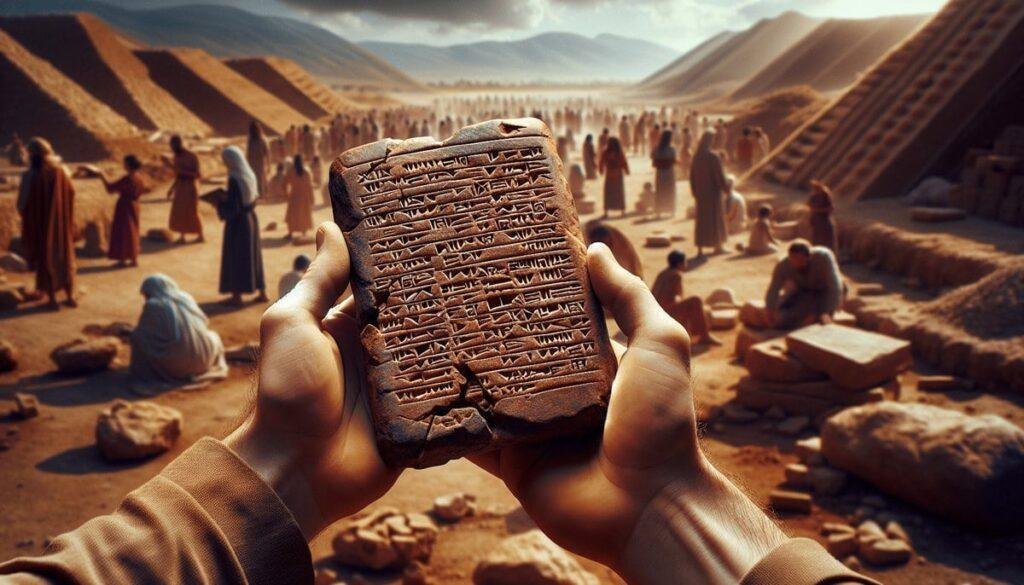In “Exploring Ethical Considerations in Biblical Archaeological Excavations,” readers are presented with an insightful exploration of the ethical implications that arise during the excavation of artifacts and sites related to the Bible. This thought-provoking article explores the dilemmas that archaeologists face when balancing the pursuit of knowledge with the need to preserve cultural heritage and respect religious beliefs. From the ethical considerations surrounding the discovery and display of sacred relics to the challenges of working with local communities, this article sheds light on the fascinating intersection of archaeology and ethics.
Principle of Preservation
Integrity of Cultural and Historical Significance
Preserving the integrity of the cultural and historical significance of archaeological sites is of utmost importance in ethical excavations. This involves ensuring that the material and immaterial heritage of the site is protected and accurately represented. It is crucial to recognize the value of these sites in understanding and appreciating the history and culture they represent.
Protection of Archaeological Remains
The protection of archaeological remains is a vital ethical consideration in excavation projects. This involves adopting measures to prevent any damage or destruction of the site during the excavation process. Archaeologists must carefully excavate, document, and preserve artifacts, structures, and features uncovered, ensuring their long-term preservation for future generations.
Conservation of Artifacts
Preserving artifacts discovered during excavations is another essential ethical consideration. Proper conservation methods must be employed to prevent deterioration and ensure the long-term stability and accessibility of these cultural treasures. This includes using appropriate storage conditions, employing specialized conservation techniques, and regular maintenance to safeguard the artifacts’ integrity.
Collaboration and Consent
Engaging Local Communities
Engaging local communities is an integral part of ethical archaeological excavations. Collaboration with local stakeholders, including indigenous communities and local residents, fosters a sense of ownership and enables the sharing of knowledge and perspectives. By involving the local communities in the decision-making process, archaeologists can ensure that their work respects and aligns with community values and goals.
Respecting Indigenous Knowledge and Rights
Respecting indigenous knowledge and rights is essential in ethical archaeological excavations, particularly when working within indigenous territories. Recognizing and acknowledging the traditional knowledge and cultural practices of indigenous peoples promotes a respectful and equitable relationship between archaeologists and indigenous communities. By actively involving indigenous communities, their rights and perspectives can be protected, and their contributions to understanding the archaeological site can be acknowledged.
Obtaining Informed Consent
Obtaining informed consent is a critical principle in ethical archaeological excavations. Archaeologists must engage in transparent and open dialogue with relevant stakeholders, including local communities and landowners. By clearly explaining the project’s objectives, potential impacts, and benefits, and ensuring community members fully understand the implications, archaeologists can seek informed consent and build trust throughout the excavation process.

Legal and Regulatory Compliance
Adherence to International and National Laws
Adhering to international and national laws is vital for ensuring ethical compliance in archaeological excavations. Archaeologists must meticulously research and understand the legal frameworks and regulations governing their work, both locally and internationally. By respecting legal obligations, they can ensure that their research is conducted within an ethical and legal framework, avoiding potential legal and ethical pitfalls.
Securing Permits and Licenses
Securing permits and licenses is essential to ensure ethical practice in archaeological excavations. Researchers must obtain the necessary approvals and authorizations from relevant governmental and regulatory bodies before commencing fieldwork. This ensures that the project is conducted in line with legal requirements and provides a formal acknowledgment of the research’s legitimacy and ethical compliance.
Addressing Cultural Property Rights
Addressing cultural property rights is a crucial consideration in ethical archaeological excavations. Archaeologists must respect the ownership rights and cultural significance associated with artifacts and heritage sites. Working in collaboration with local communities and heritage authorities, researchers can navigate issues related to repatriation, restitution, and the responsible management of cultural materials to ensure ethical and respectful treatment of cultural property.
Responsible Digging Practices
Systematic Excavation Procedures
Implementing systematic excavation procedures is essential in ethical archaeological practices. Archaeologists must follow established excavation methodologies, employing meticulous techniques to document the site’s stratigraphy and recover artifacts. By adhering to rigorous scientific principles, researchers can ensure accuracy, reliability, and reproducibility in their findings, contributing to the broader body of knowledge.
Recording and Documentation
Comprehensive recording and documentation are key ethical requirements in archaeological excavations. Precise and detailed records must be kept throughout the excavation process, including accurate measurements, detailed photographs, and meticulous notes. This documentation provides essential information for analysis, interpretation, and future research, ensuring transparency, and facilitating peer review.
Appropriate Use of Technology
The appropriate use of technology can enhance ethical excavation practices. Carefully deploying technologies such as remote sensing, non-invasive survey techniques, and advanced imaging methods enables archaeologists to gather information without causing unnecessary damage to the site or artifacts. Technology can greatly contribute to the efficiency, accuracy, and scientific rigor of excavations, ensuring ethical advancement in the field.

Ethical Procurement and Management
Sourcing and Acquisition of Funding
Ensuring ethical procurement and management of funding is crucial for archaeological excavations. Researchers must prioritize transparency and avoid financial conflicts of interest when securing funding. By choosing funding sources that align with ethical principles and maintaining full disclosure in financial matters, archaeologists can uphold their academic integrity and protect the independence of their research.
Transparent Governance and Accountability
Transparent governance and accountability are fundamental in ethical archaeological excavations. Researchers should adopt best practices for project management, ensuring that they are accountable for their actions and decisions. Transparent reporting mechanisms, open access to data and findings, and proper financial management contribute to maintaining ethical standards and fostering trust within the research community and broader public.
Ethical Treatment of Staff and Volunteers
Ethical treatment of staff and volunteers involved in archaeological excavations is paramount. Researchers must prioritize the welfare, safety, and fair treatment of all team members. This includes providing appropriate training, ensuring fair compensation, respecting labor laws, and creating an inclusive and respectful working environment that promotes diversity, equality, and mutual respect.
Archiving and Dissemination
Ensuring Long-Term Preservation
Ensuring the long-term preservation of archaeological records and artifacts is an ethical imperative. Researchers must establish partnerships with reputable institutions or organizations to ensure the safe storage and accessibility of their findings. This includes establishing appropriate archival practices, employing proper storage conditions, and digital preservation methods to safeguard the archaeological data and artifacts for future generations.
Sharing Research and Data
Sharing research and data is vital for ethical archaeological practice. Researchers must actively engage in open discourse and knowledge-sharing with fellow scholars and the wider academic community. By participating in conferences, publishing findings, and collaborating on research projects, archaeologists can contribute to the collective understanding and advancement of archaeological knowledge, fostering transparency and intellectual growth.
Open Access and Public Engagement
Promoting open access and public engagement is an integral part of ethical archaeological excavations. Researchers should strive to make their findings accessible to the public, beyond academic circles. This includes public presentations, exhibitions, and community outreach programs that engage diverse audiences, fostering public awareness, appreciation, and education about the importance of archaeological heritage and ethical excavation practices.
Heritage Tourism and Commercialization
Balancing Preservation and Access
Balancing preservation and access is a critical ethical consideration in heritage tourism and commercialization. Archaeologists must strive to find a delicate equilibrium that allows the public to experience and appreciate archaeological sites while protecting their long-term preservation. Responsible tourism practices, such as controlled visitor numbers, appropriate infrastructure development, and educational programs, can help ensure that cultural heritage sites are both accessible and safeguarded.
Resisting Exploitation and Commodification
Resisting exploitation and commodification of archaeological heritage is essential in ethical excavation practices. Archaeologists should be vigilant against the commercialization of cultural artifacts or the exploitation of archaeologically significant sites for personal gain. Efforts to prevent the illicit trade of artifacts, establish ethical guidelines for private collectors, and enforce strict regulations can help protect archaeological heritage from profit-driven exploitation.
Ethical Engagement with Tourists and Visitors
Ethical engagement with tourists and visitors to archaeological sites is a crucial consideration. Archaeologists must promote responsible tourism behavior, educating visitors about the importance of respecting the site, its cultural significance, and the need for preservation. By fostering an atmosphere of respect, understanding, and appreciation, archaeologists can help create positive and transformative experiences for tourists, contributing to the preservation of archaeological heritage.
Restitution and Repatriation
Addressing Misappropriation of Cultural Property
Addressing the misappropriation of cultural property is an ethical imperative in archaeological excavations. Archaeologists should actively participate in efforts to identify and repatriate artifacts that were unlawfully taken from their countries of origin. This involves promoting awareness about the legal and ethical implications of cultural property theft and collaborating with national authorities and international organizations to rectify past injustices and facilitate the return of artifacts to their rightful owners.
Repatriation of Artifacts and Human Remains
The repatriation of artifacts and human remains is a key ethical consideration in archaeological excavations. Recognizing the significance of these cultural objects and the rights of the communities they belong to, archaeologists should support repatriation efforts when requested. Collaborative approaches, respectful dialogue, and establishing protocols for repatriation processes are essential in ensuring the ethical treatment of artifacts and human remains.
Reconciliation and Healing
Reconciliation and healing play a crucial role in ethical archaeological excavations. Archaeologists should acknowledge the painful legacies associated with certain sites or artifacts and actively engage in dialogue and collaborative projects that seek to promote healing and reconciliation. By recognizing and addressing the past injustices, archaeologists can contribute to the restoration of dignity, identity, and cultural heritage for affected communities.
Ethical Interpretation and Representation
Cultural Sensitivity and Respect
Cultural sensitivity and respect are essential in the interpretation and representation of archaeological findings. Archaeologists must approach their research with an understanding of diverse cultural perspectives and avoid imposing their own biases or preconceptions. Interpretation should be informed by collaborative dialogue and an inclusive approach that acknowledges the multiple narratives and meanings associated with archaeological heritage.
Avoiding Bias and Stereotypes
Avoiding bias and stereotypes is crucial in ethical archaeological interpretation. Archaeologists must critically engage with their own assumptions and biases to ensure that their interpretations are based on sound scientific evidence. By actively challenging stereotypes and fostering a nuanced understanding of past cultures, archaeologists can contribute to the accurate representation and appreciation of archaeological heritage.
Inclusive Narratives and Multiple Perspectives
Inclusive narratives and multiple perspectives should be embraced in the interpretation and representation of archaeological findings. Archaeologists must strive to integrate diverse perspectives, including those of marginalized communities, into their research narratives. By engaging in collaborative research, encouraging community involvement, and amplifying underrepresented voices, archaeologists can contribute to a more inclusive and accurate account of history and cultural heritage.
Ensuring Academic Integrity and Objectivity
Avoiding Confirmation Bias
Avoiding confirmation bias is crucial for maintaining academic integrity and objectivity in archaeological excavations. Archaeologists should approach their research with an open mind, actively seeking evidence that challenges their preconceived notions. By conducting rigorous analysis, considering multiple hypotheses, and critically evaluating their own findings, researchers can ensure that their interpretations are grounded in sound methodology and objective analysis.
Peer Review and Professional Standards
Peer review and adherence to professional standards are essential in maintaining ethical archaeological practice. Researchers should actively seek feedback from their peers, submit their work to reputable scientific journals, and participate in peer review processes to uphold academic rigor. By subjecting their research to scrutiny and abiding by established ethical guidelines, archaeologists contribute to the credibility and reliability of archaeological knowledge.
Conflict of Interest and Sponsored Research
Avoiding conflict of interest and ensuring integrity in sponsored research are critical ethical considerations. Archaeologists should disclose any potential conflicts of interest arising from their research funding sources or personal relationships. Openness, transparency, and adherence to professional ethical guidelines should guide researchers in conducting their work independently and ensuring that their findings remain free from undue influence or bias.





